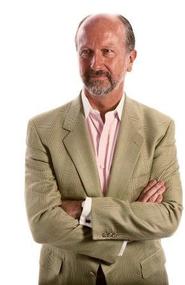
He remarked that he’s a fan of country music – he appreciates the typical bluntness and the forthrightness of the lyrics. Dickey mentioned one particular song, “Where Were You When the World Stopped Turning,” that was written shortly after the 9/11 attacks. The lyrics go: “I'm just a singer of simple songs / I'm not a real political man / I watch CNN but I'm not sure I can tell you / The difference in Iraq and Iran.” With a weary smile, Dickey explained that this phenomenon of political and cultural confusion is problematic among Americans today.
“Americans are not in a position to judge who the good and who the bad guys are,” Dickey said. The current political climate of the Middle East is admittedly chaotic and “very confusing,” but all too often Americans claim ignorance and simply wash their hands clean of the whole mess. Speaking both literally and metaphorically, Dickey remarked that “they just decide to change the channel” – or, as one man from Kansas once disclosed to him, feel that “we ought to just turn the Middle East into a glass parking lot.”
“I had an epiphany in Iran in the 1990s,” Dickey said, recounting an experience abroad that altered his perception of that country’s culture. After a horrible and violent attack on a particular Iranian village, Dickey asked surviving civilians how many people in their family had been killed. “They would answer with huge numbers like 92, 103, 78,” he said. Dickey explained that the idea of family is very different in Iran than how Americans think of family. Who we might consider “extended family,” Iranians would consider close and immediate family. “And when we talk about family,” Dickey said, “we usually use the verb ‘to have.’” Americans have children; they have parents; they have jobs, an education, a car, a house. “All of the things I have, that’s what makes me,” Dickey remarked, expounding a particularly American worldview. “In Iran people belong to families, which belong to a place, which belongs to a faith. That’s a huge difference.”
Following the tragedy of Iran Air Flight 655, in which an Iranian commercial jet carrying 290 passengers (including 66 children) was shot down by U.S. missiles in 1988, Dickey traveled to the city of Bandar Abbas to report on the disaster. With his blond hair, Dickey was clearly American – and Iranian civilians would stop him in the crowd to ask him whether he was alright. “We know it wasn’t you,” they would say, “the Americans are great people.” Dickey was taken aback by their implicit trust; what would an Iranian in an American crowd experience in a similar situation? A local officer offered his opinion that the firing of the missiles was neither calculated nor accidental: “I don’t think the Americans were careful enough not to shoot it down.”
“Iran played no role in the 9/11 attacks,” Dickey said, “and that country was among the first to denounce them.” Rather, it was in Iran’s intention to partner diplomatically with the United States in order to bring down their political enemies, like the Taliban in Afghanistan and Saddam Hussein in Iraq. Nevertheless, Bush included Iran in his famous “Axis of Evil” speech following 9/11, and suddenly Iranians found their old enemies replaced with US troops. How could they get Americans careful enough not to attack them?
Since then, Iran’s political regime has descended into corruption, and the election of current President Mahmoud Ahmadinejad resulted in major civilian protest in 2009. The government body is now something like a mafia, Dickey explained, and he posed the questions of “What should we do? What can we do?” The Obama administration says that political sanctions are the answer, but Dickey disagreed. “If you have a bunch of gangsters running a country,” he said, “nothing helps them more than sanctions.” It would be similar to Prohibition in the ‘20s, which enabled mafia men and bootleggers to make a fortune off the law. “There’s no endgame with sanctions,” Dickey said. “You can’t just tighten the screws and hope for the best.”
Instead, Obama’s offer of dialogue is “exactly what’s needed,” and Iranians understand that a helping hand, rather than overt political pressure, is what would be actually effective. An intelligence officer once remarked to Dickey that “you could kill that regime with kindness.”
Dickey then quoted the remaining lyrics of the country song verse: “But I know Jesus and I talk to God / And I remember this from when I was young / Faith hope and love are some good things he gave us / And the greatest is love.” Closing his lecture, Dickey remarked, “If I knew Jesus and if I talked to God, I’d tell him to listen to that intelligence officer.”
Posted February 23, 2010
